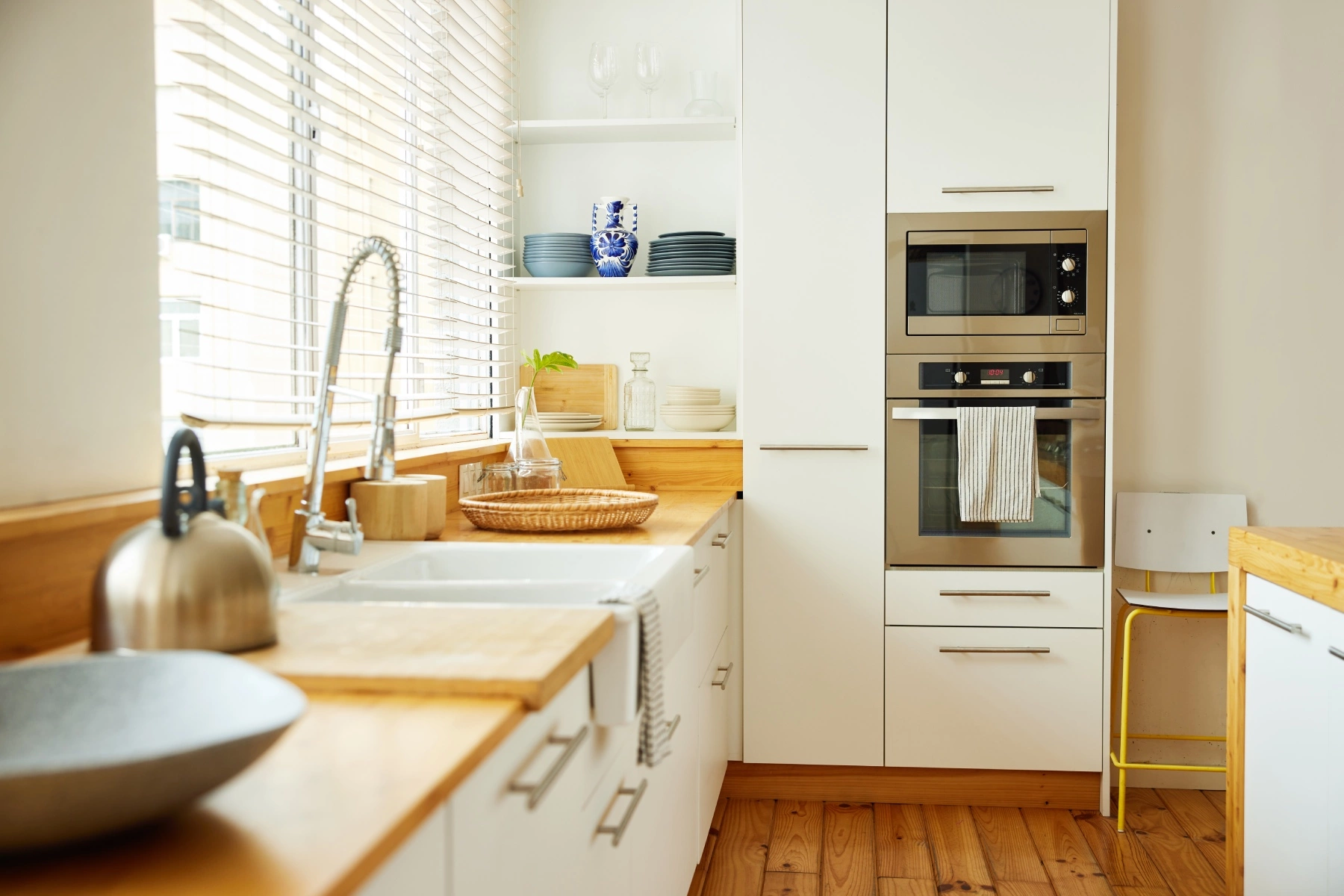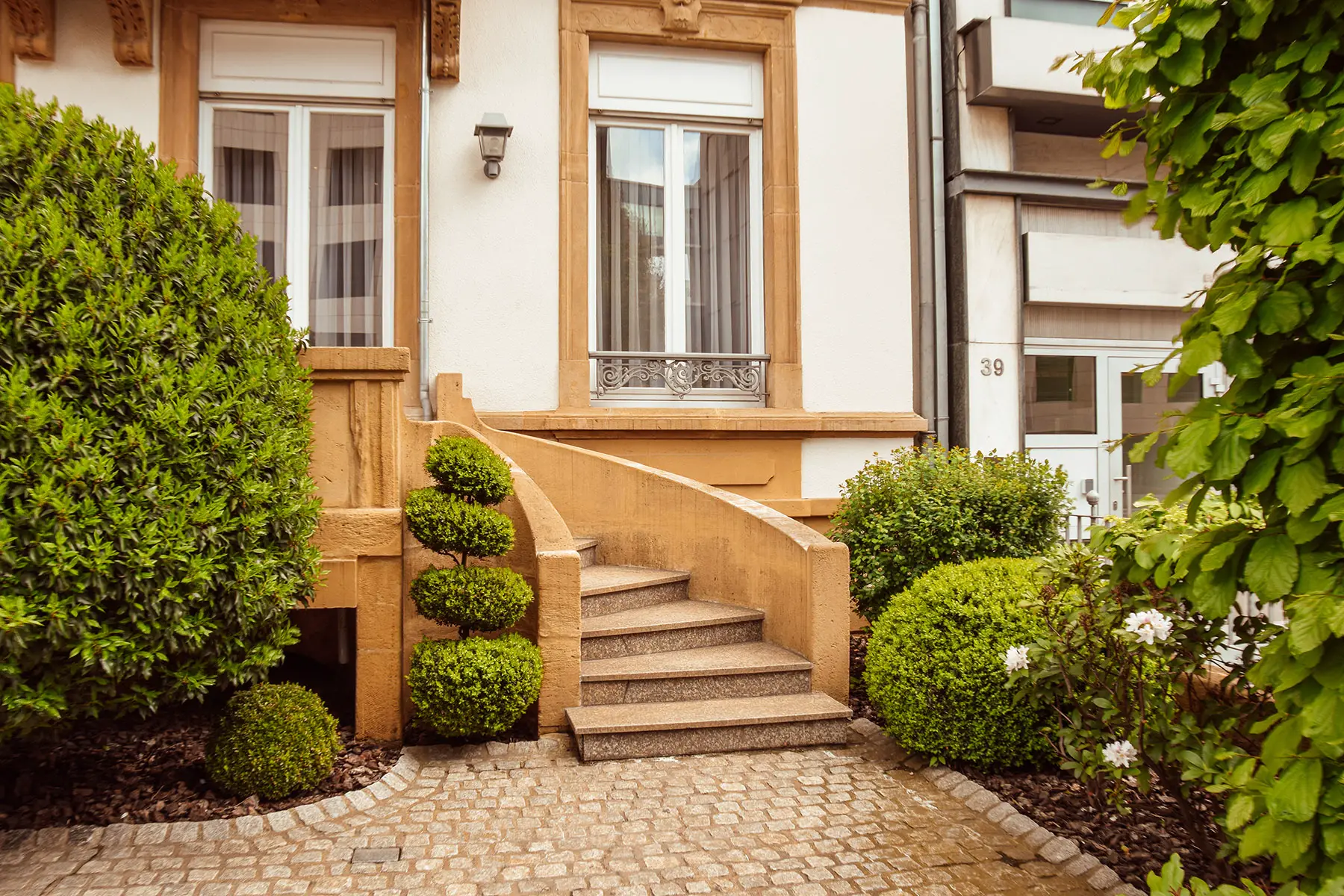If you are moving to Luxembourg for work, it might make sense to rent a home while you find your feet. The Grand Duchy is unique in that many working expats live in its neighboring countries to avoid the high property prices and cost of living. But if you do decide to settle there, this article explains the basics of renting in Luxembourg, including the following:
- Renting in Luxembourg
- Popular places to rent in Luxembourg
- Buying versus renting in Luxembourg
- Types of property to rent in Luxembourg
- Finding a place to rent in Luxembourg
- Student housing in Luxembourg
- How to rent a property in Luxembourg
- Rental costs in Luxembourg
- Social housing in Luxembourg
- Tenancy contracts in Luxembourg
- Utilities and telecommunications
- Moving out in Luxembourg
- Renting out your home in Luxembourg
- Tips for renters
- Useful resources
Use Wise for moving money abroad
Wise offers expatriate-friendly financial services including international money transfers at mid-market exchange rates with transparent, low fees, helping you save money when sending funds to family or managing finances across borders. Their multi-currency account allows you to hold, convert, and spend money in multiple currencies.
Renting in Luxembourg
Just under three-quarters (72%) of people living in Luxembourg owned their own home in 2022. This was slightly above the European Union (EU) average of 69%. In 2021, more than half of the population (58.6%) lived in houses. Meanwhile, 40.1% resided in flats and 1.3% in houseboats and camper vans.
Luxembourg’s real estate market is fast-moving, with demand often outstripping supply. This has resulted in high prices for homebuyers and renters. Understandably, many people are feeling the squeeze. In fact, official data shows that Luxembourg’s poorest residents spend more than 40% of their income on rent.

For this reason, some expats working in the Grand Duchy choose to live in Belgium, France, or Germany, where they can get more real estate for their money. Moreover, almost half (46.34%) of Luxembourg’s workforce commutes from another country, which is known as cross-border commuting. This is a much easier strategy for EU citizens, due to Luxembourg’s visa requirements.
Popular places to rent in Luxembourg
Luxembourg City
Luxembourg City is the Grand Duchy’s economic center, boasting around a quarter of the country’s population. It is home to most of the nation’s major businesses and international schools. Therefore, if you are moving to Luxembourg for work, it is likely your office will be located in or around the city.
Luxembourg City is split into 24 quarters which each have their own distinct character. These range from the buzzing central districts of Limpertsberg and Kirchberg to the quieter, more family-friendly neighborhoods of Strassen and Merl. Most properties in the city are apartments, while family homes are more commonly found on the outskirts.

The capital is by far the most popular place to rent a home in Luxembourg. Indeed, data from the Housing Observatory shows that 55% of all rental listings in the country, between April 2022 and March 2023, were in the city. Meanwhile, Esch-sur-Alzette, which is located on the French border, was the second most popular area with 9% of listings.
The average cost of rent in Luxembourg City is around €1,600 for a one-bedroom apartment and around €2,800 for a three-bedroom dwelling. However, as you might expect, rent is slightly more affordable elsewhere in the country, away from the capital.
Buying versus renting in Luxembourg
Fortunately, there are no restrictions when it comes to foreigners buying or renting properties in Luxembourg, as long as they can contend with the country’s high property prices.
A report published by the EU Commission in 2022 found that house prices in Luxembourg rose by a whopping 131% between 2010 and 2022. This is significantly higher than the EU average of 45%. However, rents increased by 17%, which is in line with the EU average.
Most expats moving to Luxembourg for work initially choose to rent rather than buy. This is because it gives them time to fully research the best places to live and allows them to move to another area if they wish to. Moreover, it frees them of the huge financial commitment that comes with buying a property in Luxembourg which involves paying registration fees, notary fees, and mortgage fees in addition to the purchase price of the home. Notably, you might also need to pay capital gains tax when you sell the property.
With this in mind, it might only be worth buying real estate if you are planning on staying in Luxembourg for the long term.
Types of property to rent in Luxembourg
Given that the majority of residents in Luxembourg live in houses that they own, it might not be surprising to learn that apartments are the most common type of real estate available to rent. This is especially the case in urban areas. Larger properties, on the other hand, may be easier to find in more rural areas.
Rental properties in Luxembourg usually come unfurnished. However, these aren’t usually completely empty and tend to include some kitchen items, such as an oven and refrigerator. Some rental apartments are also fully furnished. However, these come at a higher price and tend to lean towards short-term lets.

Notably, if you do rent a fully furnished apartment, it still might not have its own washing machine. This is because most apartment blocks have shared laundry facilities in the basement.
If the property comes with any furnishings, you will also need to sign an inventory report (etat des lieux) before moving in. This can either be mutually agreed between the landlord and the tenant, or a third party can be appointed to prepare it.
Finding a place to rent in Luxembourg
Online portals
When you first start searching for a property, you might find it helpful to use an online property portal. These list homes available to rent from local and national estate agents.
Some of the biggest property portals in Luxembourg include:
- atHome
- ImmoStar
- IMMOTOP
- Wortimmo
Property agents
Most homeowners in the Grand Duchy rent out their properties via estate agents (French: agent immobilier, German: immobilienmakler, Luxembourgish: Immobilien Agent).
Estate agents list homes for rent on property portals, their websites, and in local newspapers. Notably, those in Luxembourg must be approved by the Ministry of Economy (French: Ministère de l’Économie, German: Wirtschaftsministerium, Luxembourgish: Wirtschaftsministère) and have liability insurance.
Flatshares
If you are looking for a flatshare in Luxembourg, you can find advertisements from people searching for a room via Appartager. You might also find flatshares on Facebook groups in your area.
Relocation agencies
Relocation agencies provide a personalized service to help you find housing and deal with the formalities of settling into a new country. You can find listings of relocation agencies in Luxembourg from Editus.
Student housing in Luxembourg
Halls and shared flats are commonly available for students in Luxembourg. In most cases, you can apply for accommodation directly from your place of study. The types of rooms available in halls vary, from small single bedrooms with shared bathroom facilities to individual studios.

Student accommodation providers usually include utilities such as water, gas, electricity, and broadband in the monthly rental cost. Students must pay a one-month deposit to secure a property.
If you are looking to find a shared property with housemates, you might want to check out Appartager. Student websites such as Erasmus Play, and local groups on social media, can also be helpful.
How to rent a property in Luxembourg
Renting through a property agency
Real estate agencies let the vast majority of properties in Luxembourg. However, it is important to be aware that the market can move quickly. Therefore, if you see a suitable property advertised online (or you are informed of one via an estate agent you have registered with), you should arrange a viewing as soon as possible.
Once you have found a property, you will need to provide the agency with proof of your identity and income. This might include your passport and employment contract or payslips. Upon passing the agency’s checks, you will be given a tenancy agreement to review and sign.
Before moving in, you will need to pay a deposit to the landlord (French: bailleur, German: vermieter, Luxembourgish: Locataire). You will also need to pay fees to the estate agent (French: frais de commission, German: maklergebühren, Luxembourgish: Kommissioun Käschten). You can read more about this in detail further down the article.
Rental costs in Luxembourg
Monthly rent
Luxembourg’s Housing Observatory publishes data on average rents, based on properties advertised on the property portal IMMOTOP. It revealed that the average monthly rent in Luxembourg City in the first quarter of 2023 was €1,724, or €39 per square meter. The district of Niederanven had the highest average rents (€2,206) albeit with a lower cost per square meter (€26).
Annual rent prices in Luxembourg are capped at a maximum of 5% of the total amount the landlord has invested in the property. This takes into account the cost of buying the property (or buying the land and constructing the property) and any renovation work undertaken.

Rent increases (French: augmentation de loyer, German: mieterhöhung, Luxembourgish: Erhéijung vun der Loyer) are only permitted once every two years. The Ministry of Housing provides details of how the legal rent cap (French: plafond légal du loyer, German: gesetzliche Mietobergrenze, Luxembourgish: legal Loyer Plafong) works.
Rental deposits
Rental deposits (French: garantie locative, German: kaution, Luxembourgish: Mietgarantie) in Luxembourg can be a maximum of three months’ rent. The deposit must be paid alongside the first month’s rent when you sign the tenancy agreement. It is important to make sure that you do not pay any money before signing the contract. And if you are asked to do this, it might be a scam.
When paying the deposit, it is common to transfer it into a special bank account for the duration of the tenancy. This will ensure that the money cannot be accessed until both parties agree.
When you eventually move out of the property, the landlord can request to keep some or all of your deposit if they believe that you have broken your contract or caused damage to the property. You can read more about this further down the article.
Send Rental Deposits to Luxembourg with Wise
When securing rental accommodation in Luxembourg, you’ll need to transfer up to three months’ rent as a deposit alongside your first month’s payment. Wise offers a transparent way to send these funds from abroad using the mid-market exchange rate and low fees, helping you manage the significant upfront costs of renting in the Grand Duchy.
Learn more about Wise.
Agency/administration fees
Real estate agencies in Luxembourg charge a commission, which you, as the tenant, must pay once you have signed the tenancy agreement. The estate agency’s fee is usually one month’s rent plus VAT.
Notably, if the new tenant has been put forward by someone who already lives in the property, the fee is reduced to half a month’s rent plus VAT.
Other costs
Tenants are commonly required to pay for utilities (such as electricity, gas, and water), broadband, and a proportion of the cost of upkeep of any communal areas. This is something to bear in mind when searching for a property to rent in Luxembourg.
Help with costs
The Ministry of Housing (French: Ministère du Logement, German: Ministerium für Wohnungsbau, Luxembourgish: Ministère vum Logement) can act as a guarantor on rental deposits for low earners under the garantie locative scheme. The eligibility rules and thresholds depend on how many people are in your household.
Rent subsidies (French: subvention de loyer, German: Mietzuschuss, Luxembourgish: Loyer Subventioun) may also be available for low-income families to help them rent a home. However, again, the exact rules vary depending on the composition of the household.
Social housing in Luxembourg
Luxembourg’s Social Housing Agency (French: Agence immobilière sociale – AIS, German: Agentur für sozialen Wohnungsbau, Luxembourgish: Sozial Logement Agence) provides rented housing for people struggling to find somewhere to live on the open market. They provide accommodation for up to three years.
Social housing is available to people who have both a low income and a ‘housing-related problem’. For example, eligible applicants may be experiencing difficult personal circumstances or be living in temporary housing. You can read more about this on the government’s website.
Tenancy contracts in Luxembourg
Your tenancy agreement (French: bail à loyer, German: mietvertrag, Luxembourgish: Locatiounspräis) should cover a handful of key points. These include the rental term and monthly cost, information on how the lease can be terminated, and details of tenant and landlord responsibilities. The landlord must also provide an energy performance certificate (French: certificat d’énergie performance, German: Energieausweis, Luxembourgish: Energie Leeschtung Zertifikat).

Notably, tenancy contracts are written in French. Therefore, you may wish to have the agreement reviewed by a native speaker or enlist the services of a translator before signing it. You can find out more about tenancy agreements on the government’s website.
Tenant rights and obligations
There are several key protections in place for tenants in Luxembourg. For instance, automatic rent increases are not permitted in tenancy contracts. Additionally, rents cannot be increased in the first six months of the tenancy. After this period, they can only be increased every two years, and the amount must be fair. Moreover, if the landlord seeks to increase your rent unlawfully (for example, too early or by an unreasonable amount), you can complain.
In addition to rent, there are some costs that are only allowed to be charged for things that tenants have consumed or contributed to. This includes energy consumption for the property and common areas, maintenance of common areas, repairs if the tenant was responsible for any damage, and waste taxes charged by the municipality.
If your landlord fails to adequately repair a defect, you can take legal action and request that they reduce your rent. If the landlord fails to address an urgent issue, you may be able to arrange for the repair to be carried out yourself and seek reimbursement from the landlord.
Tenants also have certain responsibilities. For example, the property must be returned in the same condition as when you moved in, aside from reasonable wear and tear. Additionally, the tenant must adhere to the terms specified in the contract regarding making changes to the property, such as drilling holes in the wall and keeping pets.
Landlord rights and obligations
As a landlord, you are responsible for letting out a property that is safe for your tenants to live in. It is also your duty to remedy any maintenance issues that may arise during the tenancy.
If your tenant breaks the terms of the contract (for example, by not paying rent), you can seek to evict them by writing to the Justice of the Peace (juge de paix) and requesting judicial termination of the lease.
If you need to move into the property yourself, you must give the tenant at least six months’ notice and occupy the property within three months of it being vacated.
Where to go in the event of a dispute
If you have an issue with your landlord, you should continue paying your rent and try to resolve the problem amicably. However, if this doesn’t work, you should send a formal letter to your landlord by registered post, explaining the issue.
In instances where the disagreement is due to the cost of the rent, you can submit an application to the Rent Committee, which will adjudicate on how much should be paid. However, if you are unhappy with the outcome of an adjudication, you can appeal to the Justice of the Peace.
Before you rent a property in Luxembourg, you might find it useful to read the Tenant’s Rights Brochure provided by the Luxembourgish Consumer Union (Luxembourgeoise Des Consommateurs). This provides detailed advice on some of the issues you may encounter as a tenant in the country.
Utilities and telecommunications
As mentioned, tenants in Luxembourg are usually responsible for paying for utilities such as electricity, gas, water, and internet. There may already be existing suppliers to the property, in which case you can contact the relevant companies to transfer the contracts into your name.
Alternatively, you can try to shop around for a better deal. The electricity and gas markets in Luxembourg are liberalized, so it might be worth comparing the offers available from a range of suppliers. Your local municipality is responsible for administering the water service.
Notably, if you are moving into a serviced apartment in Luxembourg, your utilities will already be set up and the cost included in your monthly rent.
Moving out in Luxembourg
Tenancy periods in Luxembourg usually last for two or three years. However, this is open to negotiation with the landlord. If you want to terminate your contract at the end of the agreed period, you will need to provide three months’ notice unless otherwise stated. Both the landlord and tenant must respect the tenancy period.
If, on the other hand, you need to move out early, you may be able to negotiate this with your landlord, such as agreeing to find a new tenant yourself. If you remain in the property at the end of the tenancy period, your contract will revert to a month-to-month agreement. At this point, you will be able to move out at any time by providing three months’ notice.

If necessary, your landlord will arrange a check-out inventory report to compare the condition of the property to when you moved in.
Once this process is complete, you can request the return of your deposit. Notably, the landlord may request to retain some of the deposit if they believe that you have caused damage to the property. However, in the event of the deposit not being returned or a dispute arising, you should send a formal letter to the landlord in the first instance requesting the money. You can then take legal action as a last resort.
Renting out your home in Luxembourg
If you wish to let out your property, your first job will be to find a local agent to list it. At this point, you may find it useful to look into local rental prices to get an idea of how much to advertise it for.
You should also educate yourself on the maximum rent limits and contractual rules surrounding rent increases that we outlined earlier. Data from the Global Property Guide shows that the average rent yields on apartments in Luxembourg are around 2 to 3%.
Before renting out a home in Luxembourg, you will need to obtain an energy performance certificate, which will state the property’s energy performance class and thermal insulation class. You can find out more about requesting a certificate for your property on the government website.
Tips for renters
You can follow these tips to stay safe when renting a property in Luxembourg:
- Do your research on property portals and sign up with local estate agents. Don’t rush into viewing and making offers on properties until you are sure of your budget.
- Don’t pay any money without first viewing a property and signing a tenancy contract
- Take dated photographs of the property when you move in to protect you against disputes. Concentrate on the condition of the property and anything that might cause a dispute in the future; for example, broken fixtures and fittings or marks on the walls.
- If the property you are moving into requires repairs, get written assurances from the landlord that the work will be undertaken
- Confirm which additional costs you will need to pay before moving in; for example, charges for the upkeep of communal areas
- If you have a pet, speak to the landlord in advance about whether you will be allowed to keep it in the property. Notably, some landlords may refuse pets outright, but others will be willing to negotiate.
- Ask the landlord to show you where the fusebox and utility meters are located. Take meter readings on the day you move in.
Useful resources
- Guichet.lu – the Luxembourg government website which provides a guide to rental leases in the country
- Logement – provides the latest rental costs in Luxembourg
- ULC – the Luxembourg Consumer Union website which provides a guide on tenant’s rights




